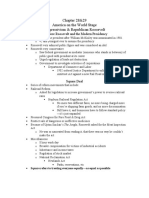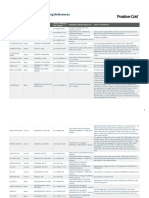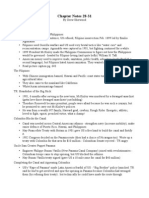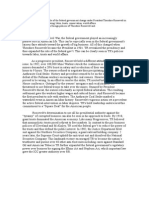Chapter 28 v2
Uploaded by
SourcingsChapter 28 v2
Uploaded by
SourcingsProgressive Roots
● In the1900 the beginning of the new century, around this time almost one in seven of
them was foreign-born.
● A movement called “ progressives’’ Their intentions was to stop monopolies, corruption,
inefficiency, and social injustice.
● Progressives’ method makes the state stronger was to give the government more power.
Which one of the progressives explain was “ to use the government as a human agency of
a human welfare.’’
● The roots of Progressivism began with the Greenback Party (1870's) and the Populist
Party (1890's).
Raking Muck with the Muckrakers
● Teddy Roosevelt was the first one to called them muckrakers. But he was unimpressed
with their ideas of only focusing on the negative in society.
● Muckraker would explain the negative but won’t give the answer to solve them. As they
believe in giving it to the public. which would catch a lot of attention. As they had no
faith in politicians taking charge.
● In 1902, a group would typically exposed to what they believed to be corruption or
injustice in writings. They were known as muckrakers. Favorite outlets for the
muckrakers were liberal, reform-minded magazines like McClure's, Collier's,
Cosmopolitan, and Everybodys.
Political Progressivism
● At his time social ranks existed making the progressives the middle class. They had a
hard to trust the high social rank people and the people at the bottom.
● The progressives did achieve a lot of things.
● They favored initiative so that voters could directly propose the legislation themselves.
● The referendum was a device that would place laws on the ballot for final approval by the
people.
● The recall would enable the voters to remove faithless elected officials, particularly those
who been bribed by their bosses.
● Australian ballot was to help get a true vote and avoid intimidation at the polls.
● Woman’s suffrage, the goal of female reformers for many decades.Which they revied
new support from the progressives early in the 1900s.
Progressivism in the Cities and States
● Local Progressives cracked down on "slumlords," rampant prostitution, and
juvenile delinquency.
● Galveston, TX successfully used the city-manager system. They wanted to put
people who were good in their good field and were trustworthy. Instead of putting
people who were corrupted
● Wisconsin was the Progressive leader for states. With the help of Fighting Bob"
LaFollette. Wisconsin was able to give the people their power back.
Progressive Women
● At this time women could neither vote nor hold political office.
● The court had a big impact on women’s decisions since they couldn’t vote.
● Women were told they could stay home and their role to take of a mother.
● Muller v. Oregon (1908) said that laws protecting female workers were indeed
constitutional. The case was successfully argued by attorney Louis Brandeis saying
women's weaker bodies suffered harmful effects in factory work.
● Women reformers gained speed after the Triangle Shirtwaist Company burnt down in
1911, as this gave women the attention they needed. Which they were provide stronger
laws and insurance to injured workers.
TR's Square Deal for Labor
● Theodore Roosevelt was inspired by the progressive. So he took charge of people’s
interests. Which meant he pursued the "three C's": (1) control of the corporations, (2)
consumer protection, and (3) conservation of natural resources.
● A strike took place in 1902 at the anthracite coal mines of Pennsylvania. The workers
called for a twenty percent pay increase and a reduction of work hours from 10 to 9
hours.
● One of the mine spokes wanted to negotiate with Geroge F Baer but refused. President
Roosevelt threatened to operate the mines with federal troops. A deal was struck in which
the miners received a ten percent pay raise and a 9-hour workday.
TR Corrals the Corporations
● The Interstate Commerce Commission (1887) had been designed to regulate railroads but
it was proving to be ineffective. Therefore, it was decided more needed to be done.
● Pass the Elkins Act in 1903. With his act, they banned and prosecuted refounds awarded
by railroaders.
● Hepburn Act of 1906. Free passes, with their hint of bribery, were severely restricted.
● Teddy Roosevelt nurtured the reputation of a trustbuster. Which he stated “there were
"good trusts" and there were "bad trusts." The bad trusts had to go.”His target was the
Northern Securities Company run by J.P. Morgan and James Hill. But his actions ruined
his image but still was able to have good trust.
Caring for the Consumer
● Upton Sinclair wrote The Jungle about the meatpacking industry's horrible conditions.
Sinclair's goal was to show the workers the situation they are in. But, the real reason was
to gross out America and initiate action in Congress.
● Congress to pass the Meat Inspection Act (1906). Henceforth meat would be inspected by
the U.S.D.A.
● The Pure Food and Drug Act was also passed. Its goal was to ensure proper labeling of
food and drugs. and to prevent tampering.
● These acts would help Europe to trust American meat and help exports.
Earth Control
● Americans had long considered their natural resources endless. Around 1900 they
realize their resources were not endless. They need to conserve as much as they
can.
● Desert Land Act (1877). It sold desert land at a cheap rate on the promise the land
would be irrigated.
● Forest Reserve Act (1891) gave the president permission to set aside land as parks
and reserves. Millions of acres of old-growth forests were preserved under this
authority.
● Carey Act (1894) gave federal land to the states, again on the promise of
irrigation.
The "Roosevelt Panic" of 1907
● People loved Roosevelt as a leader and gave him the name “ teddy bear’’
for saving a cub. But Republican bosses considered him as unpredictable
due to his Progressive ways they meddled the government into businesses.
● after winning his election in 1904, he announced he would not seek a third
term. This cut his power a bit since everyone then knew he'd be out in four
years.
● The economy took a sudden and sharp downtown in 1907. Wall Street was
pounded, banks were run, suicides went up, and there were many Wall
Street "speculators" were indicted on sneaky dealings.
● They blame Roosevelt for the economy becoming bad they named it
"Roosevelt Panic."
The Rough Rider Thunders Out
● Roosevelt was still popular in 1908 could have won the election again. But he
decided to find a similar person like himself to run. Which was William Howard
Taft.
● With Roosevelt being popular William Howard Taft won the election.
● People like Roosevelt as he was the middle ground.
Taft: A Round Peg in a Square Hole
● William Howard was a likable person among the people.
● His thinking compares to Roosevelt were not the same and problems started to begin.
The Dollar Goes Abroad as a Diplomat
● Taft wanted to American investment to boost American political interests abroad an
approach policy that his critics denounced as dollar diplomacy. Which meant to gain
power for America.
● The Dollar Diplomacy policy was to strengthen the U.S. and make money at the same
time.
Taft the Trust Buster
● Taft was more of a trustbuster than Roosevelt. Taft brought 90 lawsuits against trusts
during his 4 years in office as compare to Roosevelt with 44 in 7 and half years.
● Taft’s most noteworthy bust was the Standard Oil Company. The Supreme Court ordered
in broken into smaller companies in 1911.
Taft Splits the Republican Party
● The republican party was being split into two. Which one was being the tariff and
the other one was conservation.
● Taft had promised to lower the tariff.
● Sen. Nelson Aldrich added many increases to the bill while it was in the Senate.
● the Payne-Aldrich Bill actually broke his campaign promise and angered many.
The Taft-Roosevelt Rupture
● Roosevelt was not happy with Tafts with the policy he made as a president. Roosevelt
gave hints to run as president again.
● The fight between Roosevelt and Taft with being chosen again. Roosevelt lost the fight.
So he decided to lead the third party crusade.
The ‘’Bull Moose” Campaign of 1912
● Three people wanted to fight for the white house.
● Woodrow Wilson offered his New Freedom.
● Theodore Roosevelt offered New Nationalism
You might also like
- Chapter 28&29 America On The World Stage Progressivism & Republican RooseveltNo ratings yetChapter 28&29 America On The World Stage Progressivism & Republican Roosevelt10 pages
- Thesis Marketing Strategies of Cadbury India LimitedNo ratings yetThesis Marketing Strategies of Cadbury India Limited83 pages
- BIAS AMP Models and Modeling References PDFNo ratings yetBIAS AMP Models and Modeling References PDF4 pages
- An American Pageant (13th Edition) : Chapter 28 Outline: Progressivism and The Republican RooseveltNo ratings yetAn American Pageant (13th Edition) : Chapter 28 Outline: Progressivism and The Republican Roosevelt4 pages
- The Life of President Theodore Roosevelt: By: George PyneNo ratings yetThe Life of President Theodore Roosevelt: By: George Pyne28 pages
- Chapter 34 - The Great Depression and The New DealNo ratings yetChapter 34 - The Great Depression and The New Deal5 pages
- 100 Fin Marea Baja en El Crepúsculo. PDYNo ratings yet100 Fin Marea Baja en El Crepúsculo. PDY69 pages
- Coolidge and The Business Creed: Chapter 25 OutlineNo ratings yetCoolidge and The Business Creed: Chapter 25 Outline4 pages
- Chapter 23 - Political Paralysis in The Gilded Age, 1869-1896No ratings yetChapter 23 - Political Paralysis in The Gilded Age, 1869-18967 pages
- Right Out of California: The 1930s and the Big Business Roots of Modern ConservatismFrom EverandRight Out of California: The 1930s and the Big Business Roots of Modern Conservatism4/5 (6)
- Kami Export - US History Guided Reading Progressive Era Theodore Roosevelt's Square Deal and Social ReformsNo ratings yetKami Export - US History Guided Reading Progressive Era Theodore Roosevelt's Square Deal and Social Reforms4 pages
- Background Info: Stock Prices Had Risen Steadily in The 1920s, But A Frenzied Upsurge in 1928-29 Meant A Big Bubble Was Waiting To BurstNo ratings yetBackground Info: Stock Prices Had Risen Steadily in The 1920s, But A Frenzied Upsurge in 1928-29 Meant A Big Bubble Was Waiting To Burst9 pages
- The Presidency of Theodore Roosevelt: Leading from the Bully PulpitFrom EverandThe Presidency of Theodore Roosevelt: Leading from the Bully Pulpit5/5 (1)
- Configure ML-1660 For CUPS - Page 2 - UbuntuNo ratings yetConfigure ML-1660 For CUPS - Page 2 - Ubuntu4 pages
- Development Programs in S&T in The PhilippinesNo ratings yetDevelopment Programs in S&T in The Philippines3 pages
- The Demonic King Chases His Wife - Chapter 351-400No ratings yetThe Demonic King Chases His Wife - Chapter 351-400119 pages
- U of H Open Records Complaint To Texas Attorney GeneralNo ratings yetU of H Open Records Complaint To Texas Attorney General21 pages
- Contracts For The Benefit of Third PartiesNo ratings yetContracts For The Benefit of Third Parties16 pages
- Instant Access to Emotions as Original Existences: A Theory of Emotion, Motivation and the Self 1st ed. Edition Demian Whiting ebook Full ChaptersNo ratings yetInstant Access to Emotions as Original Existences: A Theory of Emotion, Motivation and the Self 1st ed. Edition Demian Whiting ebook Full Chapters41 pages
- Data Analysis With Excel Practical FileNo ratings yetData Analysis With Excel Practical File34 pages
- History of Philadelphia International AirportNo ratings yetHistory of Philadelphia International Airport3 pages
- 03 11 2024 - SR - Super60 - NUCLEUS&STERLING BT - Jee Adv (2020 P2) - CTA 08&15 - Q.PaperNo ratings yet03 11 2024 - SR - Super60 - NUCLEUS&STERLING BT - Jee Adv (2020 P2) - CTA 08&15 - Q.Paper20 pages
- Chapter 28&29 America On The World Stage Progressivism & Republican RooseveltChapter 28&29 America On The World Stage Progressivism & Republican Roosevelt
- Thesis Marketing Strategies of Cadbury India LimitedThesis Marketing Strategies of Cadbury India Limited
- An American Pageant (13th Edition) : Chapter 28 Outline: Progressivism and The Republican RooseveltAn American Pageant (13th Edition) : Chapter 28 Outline: Progressivism and The Republican Roosevelt
- The Life of President Theodore Roosevelt: By: George PyneThe Life of President Theodore Roosevelt: By: George Pyne
- Chapter 34 - The Great Depression and The New DealChapter 34 - The Great Depression and The New Deal
- Coolidge and The Business Creed: Chapter 25 OutlineCoolidge and The Business Creed: Chapter 25 Outline
- Chapter 23 - Political Paralysis in The Gilded Age, 1869-1896Chapter 23 - Political Paralysis in The Gilded Age, 1869-1896
- Right Out of California: The 1930s and the Big Business Roots of Modern ConservatismFrom EverandRight Out of California: The 1930s and the Big Business Roots of Modern Conservatism
- Kami Export - US History Guided Reading Progressive Era Theodore Roosevelt's Square Deal and Social ReformsKami Export - US History Guided Reading Progressive Era Theodore Roosevelt's Square Deal and Social Reforms
- Background Info: Stock Prices Had Risen Steadily in The 1920s, But A Frenzied Upsurge in 1928-29 Meant A Big Bubble Was Waiting To BurstBackground Info: Stock Prices Had Risen Steadily in The 1920s, But A Frenzied Upsurge in 1928-29 Meant A Big Bubble Was Waiting To Burst
- Theodore Roosevelt: The Fight Against CorruptionFrom EverandTheodore Roosevelt: The Fight Against Corruption
- The Presidency of Theodore Roosevelt: Leading from the Bully PulpitFrom EverandThe Presidency of Theodore Roosevelt: Leading from the Bully Pulpit
- The Demonic King Chases His Wife - Chapter 351-400The Demonic King Chases His Wife - Chapter 351-400
- U of H Open Records Complaint To Texas Attorney GeneralU of H Open Records Complaint To Texas Attorney General
- Instant Access to Emotions as Original Existences: A Theory of Emotion, Motivation and the Self 1st ed. Edition Demian Whiting ebook Full ChaptersInstant Access to Emotions as Original Existences: A Theory of Emotion, Motivation and the Self 1st ed. Edition Demian Whiting ebook Full Chapters
- 03 11 2024 - SR - Super60 - NUCLEUS&STERLING BT - Jee Adv (2020 P2) - CTA 08&15 - Q.Paper03 11 2024 - SR - Super60 - NUCLEUS&STERLING BT - Jee Adv (2020 P2) - CTA 08&15 - Q.Paper

























































































